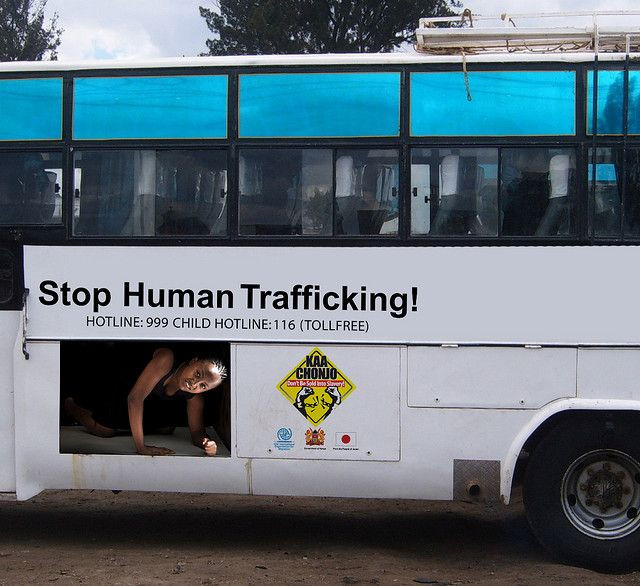DNA Databases Could Help Find Victims Of Crime And Human Trafficking

DNA databases could prove useful to officials tracking innocent victims of human trafficking, a new report shows. Researchers published their findings online in the Cell Press journal Trends in Genetics, and found several challenges of noncriminal DNA databases.
"The potential of DNA for humanitarian aid and human-rights purposes, particularly identification of live victims, remains untapped," the authors wrote. "Routine, systematic databasing of family member profiles of missing persons may assist longitudinal efforts to identify deceased and missing persons."
Co-authors Sara Katsanis and Joyce Kim, both researchers at Duke University, stated in a press release that most people fear the use of DNA databases because it gives power over the person's private information. It's also out of police jurisdiction to collect DNA of people who are not criminals from these databases. In a debate poll conducted by The Economist on the ethics of DNA databasing, Professor Arthur Caplan, director of the Center for Bioethics at the University of Pennsylvania, defended the cause saying it could legitimately help children find parents by having access to their paternal and maternal DNA. Although 61 percent of the poll participants are in favor of DNA databasing, the pioneering scientist who created genetic fingerprinting said that he prefers to put it back on to the drawing board because police are using personal data against innocent people in the United Kingdom.
"If ever there is a justifiable use of DNA, it is the protection of victims of human rights violations and human trafficking," said Katsanis. "DNA will not be useful for many types of human trafficking, but if it can be used to identify just a small percentage of victims, then we have made progress in the fight against modern slavery."
The researchers went on to stress that nongovernmental authorities could better handle the responsibility of collecting DNA for human rights victims than government-run agencies. They examined several database programs, including DNAPROKIDS, which reports the DNA profile of children either trafficked or kidnapped from parents, and collaborated with law enforcement, health care workers and academic, and NGO organizations.
Currently, more than 60 countries in the world have DNA databases that are used for criminal investigations. Some countries hold information on immigrants, refugees, adoptive children, and biological mothers. The United Kingdom has the largest database, using it primarily for public safety. These databases could potentially identify the victims if they were placed for illegal adoption, for instance. Researchers also highlighted that this technology could simplifying sharing data to put an end to cross-border trafficking. However, it is harder to build and even more difficult to gain support over worries of privacy. In addition, this debate spills into global affairs and whether neighboring law enforcement officials are willing to bend the rules or work within their current laws and regulations to assist in human rights cases.
Nearly 27 million people today are enslaved and bought or sold for sexual exploitation, labor, and fighting, according to Made By Survivors, an international nonprofit organization that employs and educates survivors of slavery and crime. Human trafficking is also tied with illegal arms trade, following drug dealing, as the second largest criminal industry worldwide today. It is also the fastest-growing market, according to the American Public Health Association (APHA)
While health is largely ignored in the human trafficking platform, the APHA points out that most of the victims live in dire conditions. Many barely survive, facing poor nutrition and living conditions that contribute to scabies and tuberculosis, among other diseases. For work and labor victims, chronic back pain and hearing or vision issues arise while working in heavy duty construction, agricultural areas, and sweatshops. Rates of physical abuse and transmission of STDs are alarming in prostitution cases, not to mention the mental trauma that can often accompany these living situations, including anxiety, depression, sleep disorders and posttraumatic stress disorder. For example, the three recently rescued Cleveland women found in the home of suspected kidnapper Ariel Castro will probably face a long road to recovery after 10 years of imprisonment.
It is especially difficult for younger victims because they are in "a transitional period in [their] life," Jodi Quas, a professor of psychology and social behavior at the University of California, told the International Business Times. Among the horrific ordeals these women faced were rape, shackling, and one of the victims even faced pregnancy and punches to the stomach that induced miscarriages. These women will have to overcome the fear they experienced while living with the abuser.
"Combatting human trafficking is going to require creativity and collaboration amongst government authorities, law enforcement, social services, academics, and victim advocates," Kim said. "We envision multiple approaches and solutions and would like to see the perspectives of the participants and victims be considered as approaches develop."
Source: Kim J, Katsanis S. Brave New World of Human Rights DNA Collection. Trends in Genetics. 2013.
Published by Medicaldaily.com



























